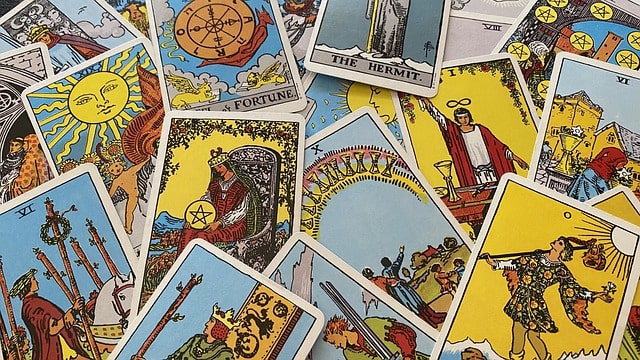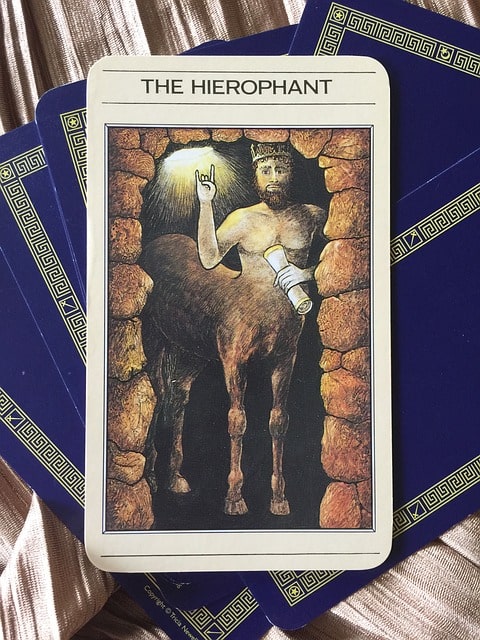
Starting out in tarot often means having trouble choosing a tarot deck. There’s so much choice in tarot that it’s common to not be able to choose a deck easily. Most who already follow tarot will tell you to “follow your intuition” when choosing a tarot deck.
This is good advice, because the tarot is all about your intuition anyway. Reading the tarot is about accessing your intuition, so a deck that speaks to your intuition is critical. Naturally, following your intuition is easier said than done. Below, we tackle tips and suggestions on choosing a tarot deck.
Picking a tarot deck these days is no easy feat given the embarrassment of riches we have for choice. Because tarot is an ever-evolving art, not every deck runs with everyone’s intuition. Therefore, it’s vital that you choose a tarot deck that vibes perfectly with your personal intuition
Our ancestors weren’t so lucky with their tarot deck options. After all, tarot was still developing at the time. Most of them just ran with the standard deck with seventy-eight cards. No modifications of any kind in that deck and that probably resulted in them not having perfectly intuitive readings.
Don’t worry about yourself though. With all the new choices, all you need is a basic primer on choosing your deck! Knowledge on how to pick a tarot deck is all right here!
How to Choose a Tarot Deck
Was it a blessing of a curse for our ancestors to not have so many tarot decks to choose from? Given the surge of new decks in the past decade, choosing a tarot deck is a daunting task. Of course, it is much easier to think of the abundance of choices as a blessing, rather than a curse.
With so many tarot reviews online now, you can easily become familiar with decks before you buy them. Naturally, this doesn’t mean choosing the right tarot deck isn’t challenging! To choose a tarot deck is to choose which one you’ll be using to access your intuition.
Try to embrace the challenge instead. Think of it as a part of your experience in selecting a tarot deck. You should learn about the different decks and what distinguishes them from each other before choosing a tarot deck.
Learning what is unique about each of them will expand your knowledge of the tarot. Such can only improve your readings in the future as you access your intuition. Don’t try to learn too fast in the event that information overload frustrates you out of the tarot. Take your time to enjoy the process and remember why you started doing tarot in the first place.
Remember Why You Do Tarot

Remembering your motivation for doing anything is key to getting through any ordeal. In the process of choosing a deck, remembering why you do tarot in the first place is helpful. Having a goal is helpful too, but it is almost always more helpful to remember why you started doing tarot in the first place. It helps point you in the right direction.
Did a professional tarot reading draw you into the profession of doing tarot yourself? Mayhap your reader’s cards inspire you to make a new deck choice? Seeing what other decks are around is the start of your research for new deck choices.
Perhaps you were even from another related field like astrology or Wicca and these pointed you towards the tarot? Decks with integrated symbolism from those fields are more helpful in accessing your intuition. Tarot and other divination fields both require your intuition to operate well, so meshing them together is good.
Maybe it was your belief system? Are you Christian? Druidic? Buddhist? Some people often unlock their intuition with decks that feature symbols from these belief systems. If you’re Christian, find a tarot deck with Christian symbolism on the cards. You can do the same for any other belief system.
How Will You Learn Best?
Take some time to think about how you plan to read the tarot. Maybe you’re lucky enough to know someone experienced in tarot already who can teach you. Perhaps you’ve seen a few tarot blogs and found a few types of tarot that speak to you.
You might even be planning to learn on your own. Whichever of these it is, it’s critical to your decision-making process. Difficulty abounds for people who are trying to learn from someone else while their tarot decks are different. It seems simple, but some people still totally forget that they need to have related tarot decks with their mentor.
For example, there’s the Rider-Waite deck and the Thoth deck. Members of the Hermetic Order for the Golden Dawn made both these decks in the 20th century. Despite this, the two decks are fundamentally different from each other. The Thoth deck totally renamed some of the 22 Major Arcana in the deck. Rider-Waite decks reordered the Major Arcana and replaced Minor arcana pips with vignettes of people.
On top of that difference, readings are also fundamentally distinct between these two decks. With Rider-Waite cards, you read them depending on whether you drew them upright or reversed. Meaning is something that you assign after you draw a card and determine its position.
As for the Thoth deck, its cards don’t have an upright or reversed meaning. You read them depending on where the cards sit in relation to other cards. Matching or opposed suits are also something to consider in a Thoth reading.
If you plan to learn alone, avoid obscure decks that were clearly made for more experienced tarot readers. There’s no shame in picking a more popular or mainstream deck. More resources and people will be available to help you that way.
After Your Choice

If you used your intuition and followed these suggestions, you should have a tarot deck in hand now. It should be right for you and you can start reading right away! The keyword is to “read.” Learning the deck is easiest when you use the deck and read for yourself, at least. Consult your resources if you have to during a tarot reading, even if it’s just for yourself.
You’ll learn faster that way. Further, using the cards is the only way to learn whether you really did pick the right deck for yourself. It might be the right one; it might not be as well. Tarot deck choices are often a game of trial and error and sometimes the game doesn’t end.
As you grow in understanding and experience with tarot, you may find yourself evolving to want different things. Different things from the deck, that is. It’s entirely possible to outgrow a certain deck and want to use a different one that unlocks your intuition better. Accepting that you’ll probably go through a lot of different decks as you experience tarot is a good thing to do.
Growing in Experience
Don’t feel too bad if you’re going through tarot decks fast. It’s natural in the game of trial and error in choosing a deck. As you grow in experience, you’ll get better at choosing which deck best accesses your intuition. When that happens, you won’t have to drop your decks so quickly in favor of another one.
As you access your intuition better, you may even start advising others on how to choose their own decks. The tarot is all about intuition, so helping others choose their decks is something you’ll only manage when you’re experienced. Don’t attempt it before then.
Not only would you be setting a bad example for tarot initiates, you’d actually be damaging their tarot experience. They’ll choose a certain deck. After that, let’s say you advised them and you lacked experience or had unaccessed intuition. This causes it to be the wrong choice for them.
Due to this, they’ll waste time on an error. It’s an inefficient way to go about the tarot deck game of trial and error to say the least. Take some time to learn how to choose your deck first before you advise others.
